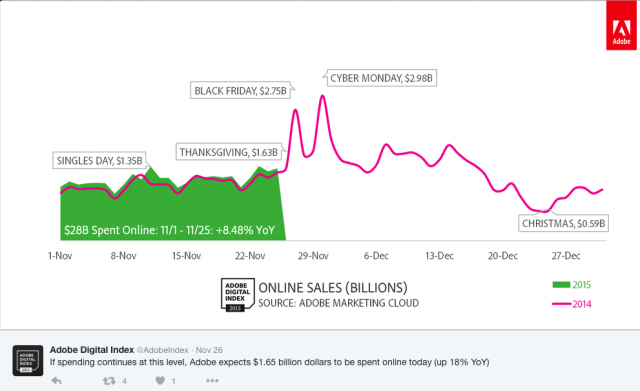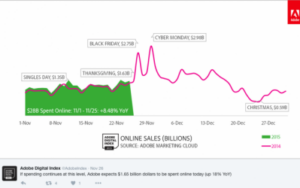Call it the Black Friday that turned grey. US retail found the shopping frenzied crowds that traditionally appear the day after Thanksgiving in the US didn’t quite materialize this year, as more turkey stuffed consumers simply sat at home clicking, swiping and yes even speaking directly into their way-smart mobile devices (mostly smartphones) that now dominate the retail shopping scene.

 Recent Tweet Online Sales for Thanksgiving Source: Adobe Systems Inc. Online consumer shopping experienced a whopping 17% boost in sales from one year ago according to Adobe Systems Inc.(ASI). ASI tracked over 4500 retail shopping sites to determine the online growth numbers that the group said will continue to grow as “cyber Monday” results began to flow in. The most recent tweet from the research firm http://reckons $8.03B in online sales between Thanksgiving and Sunday a 17% boost (or $1.14B more) over 2014 numbers. Thanksgiving Day saw a 25% boost in online sales according to Bloomberg, and Monday should add another $3B to that total sales number according to the ASI group, making it the largest online sales day IN RECORDED HISTORY as the headline reads (umm… how old is the internet and online shopping again?)
Recent Tweet Online Sales for Thanksgiving Source: Adobe Systems Inc. Online consumer shopping experienced a whopping 17% boost in sales from one year ago according to Adobe Systems Inc.(ASI). ASI tracked over 4500 retail shopping sites to determine the online growth numbers that the group said will continue to grow as “cyber Monday” results began to flow in. The most recent tweet from the research firm http://reckons $8.03B in online sales between Thanksgiving and Sunday a 17% boost (or $1.14B more) over 2014 numbers. Thanksgiving Day saw a 25% boost in online sales according to Bloomberg, and Monday should add another $3B to that total sales number according to the ASI group, making it the largest online sales day IN RECORDED HISTORY as the headline reads (umm… how old is the internet and online shopping again?)
One other metric from IBM Commerce said U.S. online sales for Black Friday was up a more significant 21.5% over 2014 numbers. This includes smartphone access to online shopping at a whopping 44.7% of total online traffic. The group also reckons Smartphone shoppers spent an average of $121.06 per order, up 4.3% over last year.
The Adobe group is also tracking a new “Social Sentiment” metric that watches “mentions” of terms that relate to “joy” or “admiration”; the early trends show it’s Cyber Monday not Black Friday that dominate this metric, with 55% vs. 40% mentions tracked respectively, according to the Adobe Digital Index (ADI).
And what of traditional retail, or brick and mortar, you might ask? In the two days (Thanksgiving and Black Friday) brick-and-mortar sales fell from last year to $12.1B. So says ShopperTrak, which published its 2014 numbers at roughly $12.3B (that’s 9.1B on Friday and 3.19B on Thanksgiving 2014.)
“Retail is in the middle of an incredible revolution and evolution,” according to the National Retail Federation (NRF) that tracks its members and confirmed that more people shopped online than in stores during the Thanksgiving holiday weekend. Looking for a positive spin, Matt Shay, NRF president was quoted in its industry press release on Monday stating “We recognize the Thanksgiving weekend shopping experience is much different than it used to be as just as many people want that unique, exclusive online deal as they do that in-store promotion. It is clear that the age-old holiday tradition of heading out to stores with family and friends is now equally matched in the new tradition of looking online for holiday savings opportunities,” he said.
Some retail guru’s reckon in the US anyway, the traditional Christmas shopping season that kicks off the day after Thanksgiving Thursday, has simply morphed into a longer post-Halloween event with evidence of Santa and those eight tiny reindeer showing up on retail shelves on November 1st. (that’s All Saints Day) or the day after All Saints Eve, also know as Halloween.
So for US Retail this year it’s Trick or Treat with the “trick” in getting those halloween shelves converted to Christmas shopping weeks earlier than in past years and getting that online web site up to speed to compete with the likes of Amazon, EBay Walmart and Target Corp.
– Steve Sechrist
Analyst Comment
ShopperTrak also pointed that a number of major US retailers including Barnes & Noble, T.J. Maxx, Nordstrom, DSW, and Staples decided not to open on Thanksgiving, bringing them into line with a recent study from RichRelevance that shows that 56% of Americans “hate” or “dislike” the practice of shopping on Thanksgiving, while only 12% “like or love” it. In the UK, where Black Friday has been developing in the last few years (without the distraction of a hangover from the turkey!), Asda, which was a pioneer of bringing the US tradition to the UK, did not support it. Plenty of others did, although things were not quite as frantic as last year. Last year’s Black Friday came after a couple of months of poor retail sales, so there was a feeling that there was some pent-up demand. (BR)

